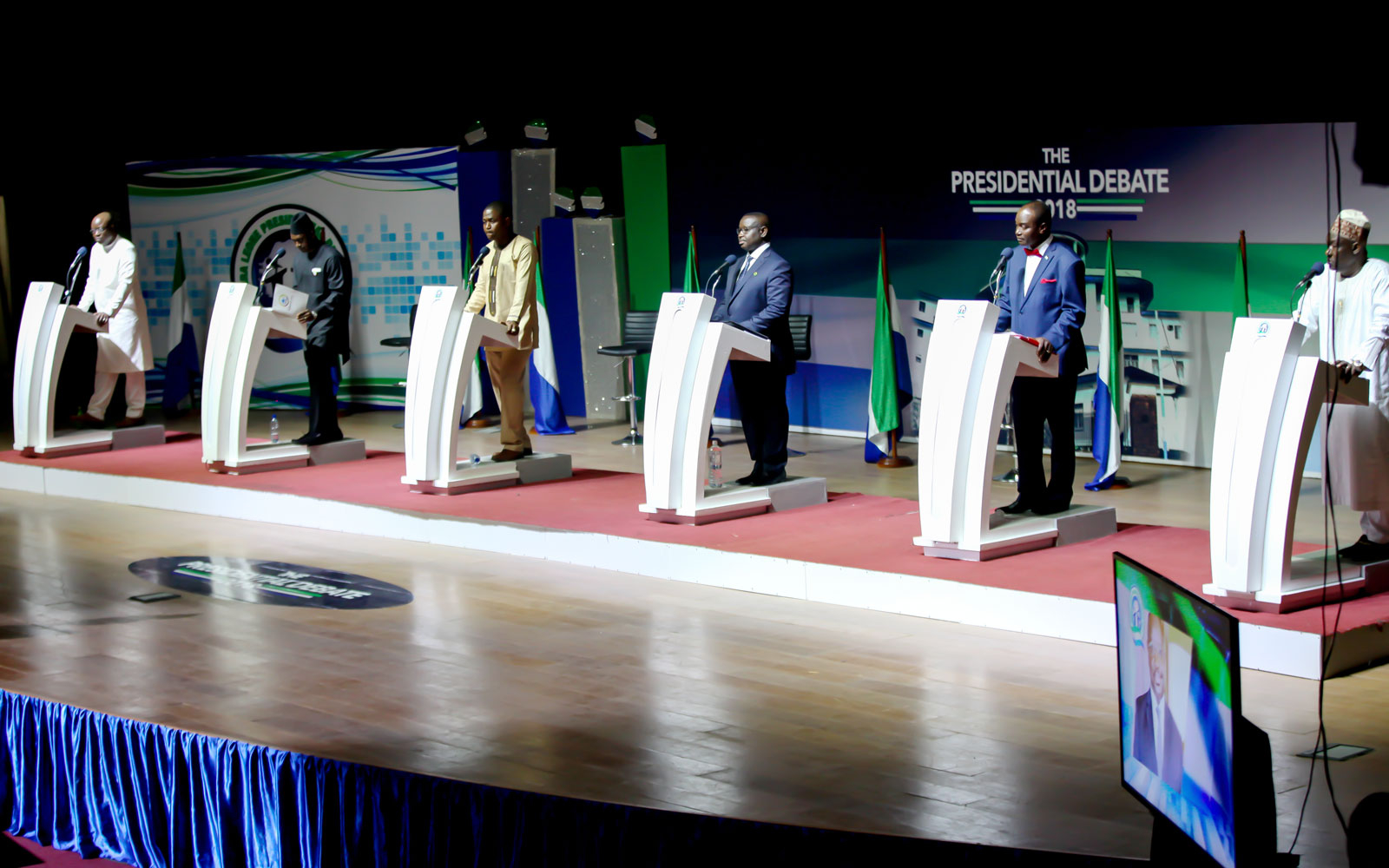
Six presidential candidates engage in policy-based debate in Freetown, Sierra Leone, ahead of the March 7 elections. Credit: Vickie Remoe
SHARE
The streets were empty as Sierra Leoneans gathered in front of televisions and radios to witness six presidential contenders participate in a three-hour debate, the first in the country’s history to feature all major political parties. In the past, the ruling party has declined to participate or failed to appear on debate night. Broadcast by major television stations and dozens of radio networks across Sierra Leone and live streamed around the world, the February 15 debate allowed candidates to engage in policy-based dialogue and share their vision for the future of Sierra Leone ahead of the country’s March 7 general elections.
I am happy I attended this history-making event. I did not have a candidate coming here today, but I think I now know who to vote for.
- Presidential Debate Audience Member
Sierra Leonean politics have historically centered on ethnic or regional allegiances rather than policy positions. The moderator, acclaimed BBC reporter Hassan Arouni, probed the candidates on their plans for the economy, healthcare, education, gender equality, infrastructure, and fighting corruption. This format provided voters the opportunity to look beyond identity politics and understand the candidates’ policy platforms.
“I am happy I attended this history-making event. I did not have a candidate coming here today, but I think I now know who to vote for,” an audience member told Reuters after the debate.
The March presidential and parliamentary elections represent a key milestone in Sierra Leonean history, as President Ernest Bai Koroma of the All People’s Congress has reached his constitutional term limits after 10 years in office and will not contest the election. While election cycles since the civil war ended in 2002 have been considered free and fair, governance gaps have hindered effective responses to crises like the Ebola outbreak in 2014 or the deadly mudslide in Freetown in 2017. Moreover, there has been a lack of opportunities for direct citizen engagement with presidential and legislative candidates, reducing possibilities for holding them accountable for promises made, once elected. Marginalized communities, such as women and youth have felt more strongly the effects of these political challenges.
Youth-candidates-with-sign-language-interpreter_cropped.jpg

In preparation for the debates, NDI assembled a group of internationally-renowned debate experts to collaborate with the Sierra Leone Debate Organizing Committee, including members of the Commission on Presidential Debates (CPD) and Debates International. The experts advised debate organizers on everything from debate format and production to media strategy, set design and considerations for persons with disabilities. As with the presidential and youth debates, a sign language interpreter will be present for the TV broadcast of the women debate, allowing Sierra Leoneans of all hearing levels to learn about the candidates’ policy positions.
Through the production of the debates, the Sierra Leone Debate Organizing Committee set a new standard for policy-based dialogue aimed at helping voters make an informed choice at the ballot box and holding elected officials accountable to campaign promises once in office. The committee also set a new standard for collaboration among Sierra Leonean civil society, media and government institutions by including committee members from the Sierra Leone Association of Journalists, Search for Common Ground, African Youth Voices TV, the Political Party Registration Commission, the National Election Commission, the Independent Radio Network, the Sierra Leone Broadcasting Corporation and the Standing Together for Democracy consortium. NDI’s assistance was made possible with the support of the U.S. Agency for International Development.


